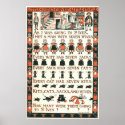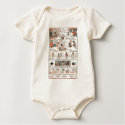I know the title sounds like this post is going to be about getting fussy kids to eat at meal time; but it's not. Well, at least not in terms of parenting. It's about all of us eating poorly and forging bad relationships -- not only with food in addictive ways, either, as you'll see...
Over at Kitchen Preserve (where there are some great recipes!), I was reading Rebecca's "about" page where I found this incredible bit:
The writer Michael Pollan says that we should not “eat anything your great great-grandmother would not recognize as food.” Pollan means that we should eat whole, natural, unprocessed foods. But specifically, what did our great great-grandmothers eat? Do you know? I wish I knew more details of my ancestor’s recipes–but unfortunately no one ever wrote much down.(Rebecca should read more vintage and antique cookbooks, magazines and publications -- she'd likely be surprised!)
In Pollan's article, Unhappy Meals, the author explores the history behind our current bad diets. The article is long, but absolutely recommended reading. Today, this part sticks out:
No one likes to admit that his or her best efforts at understanding and solving a problem have actually made the problem worse, but that’s exactly what has happened in the case of nutritionism. Scientists operating with the best of intentions, using the best tools at their disposal, have taught us to look at food in a way that has diminished our pleasure in eating it while doing little or nothing to improve our health. Perhaps what we need now is a broader, less reductive view of what food is, one that is at once more ecological and cultural. What would happen, for example, if we were to start thinking about food as less of a thing and more of a relationship?Clearly living off the land, near the land, with the earth, is better for all who live on it.
In nature, that is of course precisely what eating has always been: relationships among species in what we call food chains, or webs, that reach all the way down to the soil. Species co-evolve with the other species they eat, and very often a relationship of interdependence develops: I’ll feed you if you spread around my genes. A gradual process of mutual adaptation transforms something like an apple or a squash into a nutritious and tasty food for a hungry animal. Over time and through trial and error, the plant becomes tastier (and often more conspicuous) in order to gratify the animal’s needs and desires, while the animal gradually acquires whatever digestive tools (enzymes, etc.) are needed to make optimal use of the plant. Similarly, cow’s milk did not start out as a nutritious food for humans; in fact, it made them sick until humans who lived around cows evolved the ability to digest lactose as adults. This development proved much to the advantage of both the milk drinkers and the cows.
It's not just the extra work we do preparing our foods that keeps us fit (even more so when we garden and grow our own food) or that cooking our own food keeps more of the natural nutrients in our food than processed food-stuffs does, but that we build relationships. Relationships with the cycle of life, the planet and those who inhabit it with us, and relationships with those we spend time growing, preparing and eating with.
I don't think it's possible or advisable for us all to be farmers and produce (grow and raise) all that we eat. But I do think we'd benefit from asking ourselves if what we are putting into our bodies could actually be something we could produce.
If not, we probably shouldn't be eating it.
Which reminds me, will you be watching Jamie Oliver's Food Revolution tonight?





















4 comments:
Oh my gosh, I loved this! I've been making a conscious effort since January (a New Year's resolution of sorts) to eat more REAL food. Not a novel concept, right? It's amazing how much food out there is just completely made up...not natural at all! Thanks so much for writing this post. It really hit home for me.
*Julie
I understand what he means, but I don't come from a family of great cooks, and there are an awful lot of things my great-grandmothers wouldn't have considered proper food, that are both healthy and delicious.
The other thing that bugs me about this, though, is that it romanticizes what our ancestors ate. If you lived somewhere where you could grow your own food, great, but a lot of people who lived in the city (unknowingly) ate spoiled and adulterated food because they couldn't produce their own, and there were very few laws regarding what could be added to food. I'm not talking preservatives: I'm talking sawdust, colorings based on toxic metals, non-food fillers, etc. A lot of people weren't eating fresh, natural, food then, either.
A lot of people who did live on farms grew cash crops, not food crops, too. Poor sharecroppers got pellagra and other nutritional-deficiency diseases because they were growing tobacco to pay the rent and living on corn meal and salt meat. We don't remember that now, and the idea that people in the U.S. could suffer from that kind of malnutrition seems bizarre, but it was there.
Hi-
Thanks for reading! I love your site.
I think I should have been more clear--I love old cookbooks, it was just that my family never wrote anything down. I am so glad others did. I am reading The Kentucky Housewife right now and some of the recipes in there seem like they are so modern. It is amazing.
Little Black Car is also right that old fashioned food was not all warm biscuits and homemade jam. I know a lot of old recipes were designed just to cover up the taste of rancid meat. My own great grandmother lived on bread and lard for years as a child. So, it is true that everyone in every era has had their own food problems. I think Pollan just meant it as a reference for foods to avoid--any genetically altered, flavored, artificially messed with--but I get your point.
Anyways, thanks again and have a great day!
Thanks for the comments!
I would like to address the issue of romanticizing the past a bit...
Those who know me, regular readers of my posts here (especially this post) and my other blogs (including here), know I'm more historian than one to wax nostalgic in ways that romanticize the past. One of the reasons I so liked Pollan's article so much.
If you read his article, you'll see he's far less romantic than the quote Rebecca and I liked so much. While he doesn't point out some of the issues brought up here, I don't think he'd argue with them. I don't either ;)
The general point is that even if avoiding all processed foods was likely or even possible (and there are times processed has advantages), overall eating more natural foods has more benefits than processed foods.
Not that my comment here should end the discussion -- I like discussion!
Post a Comment